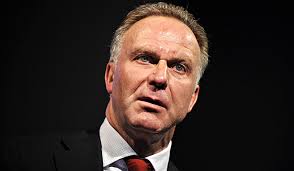By Andrew Warshaw
March 28 – The head of the body representing the majority of Europe’s leading clubs has radically changed his views about the idea of a breakaway super league now that UEFA has agreed to revamp the Champions League in favour of the biggest and wealthiest teams.
In marked contrast to previous statements on the subject, Karl-Heinz Rummenigge, head of the European Club Association (ECA), no longer believes in the concept of a closed, 20-team elite competition which would involve clubs breaking away from their national leagues.
UEFA’s changes mean more group stage places will be set aside in the 2018-21 cycle for teams from the top four leagues and fewer for clubs from smaller leagues.
“We agree completely with the reforms,” said Rummenigge following the ECA’s annual assembly in Athens. “I am 100% sure that they will make the Champions League more emotional and stronger than ever.”
“Regarding a super league, we have a clear position that we are happy to stay under the umbrella of UEFA and will continue to co-operate with them in future.”
Rummenigge’s conciliatory views may also have something to do with the fact that new UEFA boss Aleksander Ceferin has taken the canny step of granting two full member positions on the exco to the ECA.
He even went as far as rejecting claims that the UEFA changes mean the rich will get richer and the poor poorer. “This is totally false,” Rummenigge told reporters. “In fact I would call it fake news.”
Newly presented figures, he said, showed that distribution payments by UEFA to eliminated Champions League clubs would rise by 224% and by 264% in the Europa League.
“The biggest beneficiaries are the mid-sized clubs,” said Rummenigge, “those like Holland and Scotland.”
ECA general secretary Michele Centenaro said it was unfair to blame imbalances in the European game solely on UEFA. “The main source of imbalance is not UEFA distribution but rather the top leagues,” he said.
It was a view supported by ECA board member and Juventus boss Andrea Agnelli. “What creates competitive imbalances in Europe right now is mostly revenues generated by broadcasting rights at domestic level,” he said, without mentioning the English Premier League or any other league by name.
When it comes to FIFA and the club-versus-country landscape, Rummenigge has a very different attitude, repeating his opposition to a 48-team World Cup.
“FIFA knows we are unhappy with the fact they have increased the number of participants at the World Cup by 50%,” said the Bayern Munich supremo and former World Cup star.
“The way the decision was made was not acceptable from our position. FIFA has to accept that they are using our players in favour of a World Cup.”
Urging a reduction of international fixtures, he added: “The biggest problem we have to face in football are national team matters because they are always growing. The point has come where the authorities have to think a bit more about football and not just about finances and politics.”
Contact the writer of this story at moc.l1751596508labto1751596508ofdlr1751596508owedi1751596508sni@w1751596508ahsra1751596508w.wer1751596508dna1751596508

